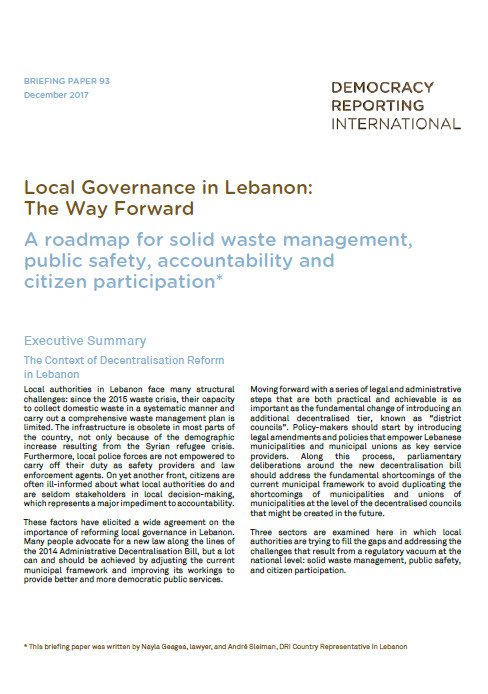Local Governance in Lebanon: The Way Forward
 |
A roadmap for solid waste management, public safety, accountability and citizen participation
note Dec 2017 ; 20 pages
Aut. Nayla Geagea &
Ed. DRI - Berlin
Téléchargeable sous format: PdF
Téléchargeable chez l'éditeur
Page de présentation d'un éditeur
Abstract:
Local authorities in Lebanon face many structural challenges: since the 2015 waste crisis, their capacity to collect domestic waste in a systematic manner and carry out a comprehensive waste management plan is limited. The infrastructure is obsolete in most parts of the country, not only because of the demographic increase resulting from the Syrian refugee crisis. Furthermore, local police forces are not empowered to carry off their duty as safety providers and law enforcement agents. On yet another front, citizens are often ill-informed about what local authorities do and are seldom stakeholders in local decision-making, which represents a major impediment to accountability.
These factors have elicited a wide agreement on the importance of reforming local governance in Lebanon. Many people advocate for a new law along the lines of the 2014 Administrative Decentralisation Bill, but a lot can and should be achieved by adjusting the current municipal framework and improving its workings to provide better and more democratic public services.
Moving forward with a series of legal and administrative steps that are both practical and achievable is as important as the fundamental change of introducing an additional decentralised tier, known as “district councils”. Policy-makers should start by introducing legal amendments and policies that empower Lebanese municipalities and municipal unions as key service providers. Along this process, parliamentary deliberations around the new decentralisation bill should address the fundamental shortcomings of the current municipal framework to avoid duplicating the shortcomings of municipalities and unions of municipalities at the level of the decentralised councils that might be created in the future.
Three sectors are examined here in which local authorities are trying to fill the gaps and addressing the challenges that result from a regulatory vacuum at the national level: solid waste management, public safety, and citizen participation.
Mot clef: |
Pays concerné: |
Editeur/Diffuseur: |
|
DRI
-
Democracy Reporting International - Berlin - Allemagne |
En cas de lien brisé, nous le mentionner à communication@pseau.org